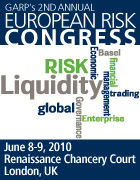As a measure of how fascinating Mr. Jackson's presentation was, let me just say that I never once saw someone take out their Blackberry to check email or surf the web. Mr. Jackson delivered some heavy food for thought, and the hundreds in dark suits were all his. Here, then, are some highlights (we'll see if we can't get a copy of the presentation too, but don't hold your breath):
Overview:
Compensation packages played a contributing factor to the recent financial crisis. Restoring trust by changing compensation practices will help us get on the right course. A number of elements will play a key role in this re-alignment, as discussed:
- Administration Principles on Compensation Reform
- FSB Implementations Standards
- Proposed Federal Reserve Guidance
- TARP Compensation Regulations and Special Master Rulings
- Summary of Considerations
2. In September 2009, all G-20 countries agreed to tough new implementation standards that will guide compensation decisions at financial institutions worldwide. See the Financial Stability Board standards here.
3. The Federal Reserve has issued proposed guidance identifying three key principles on the relationship between pay and risk, including:
- Balanced risk taking (e.g. lower sensitivity of pay settings)
- Effective controls and sound risk management (e.g. do risk managers have the independence they need?)
- Strong corporate governance (e.g. compensation committees should be set up, and they should communicate pay rates and reasons to the public)
- Special assistance firms like AIG and GMAC, for example, but these principles should be promoted beyond special assistance companies. There is a fundamental gulf of understanding of compensation between what executives understand and public understand.
- Analysis of the relationship between compensation and risk taking
- Structural governance protections
- Substantive guidance on pay structures
- Disclosure and accountability to shareholders and the public
Early empirical evidence of reform: Goldman Sachs, Morgan Stanley rewards payouts will take into account fundamental risk management measures. If risk management does not work, compensation is reeled in.
***
There were just a couple of questions from the audience:
Q. Relating to the market: How will firms retain the talent? Also, a dollar now is worth more than a dollar in the future, which might actually increase compensation packages.
A. Employees hedging compensation is absolutely critical. Stock sold short does not help the principle of the matter very much, if they were supposed to hold onto it for a few years.
Q. Final date for release of rules? Who will regulate?
A. Finalized by end of this year, early next. But the Federal Reserve is operating in face of regulatory uncertainty. U.S. Treasury wishes to be ahead of the analysis before new rules/guidance are promulgated. A new law is not needed, Boards want to get this compensation structure right.
***
Up next, some very brief notes from a panel discussion on emerging CRO roles.






1 comments:
Excellent summary of the sessions and events!
Post a Comment